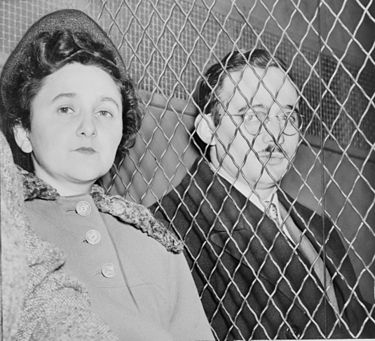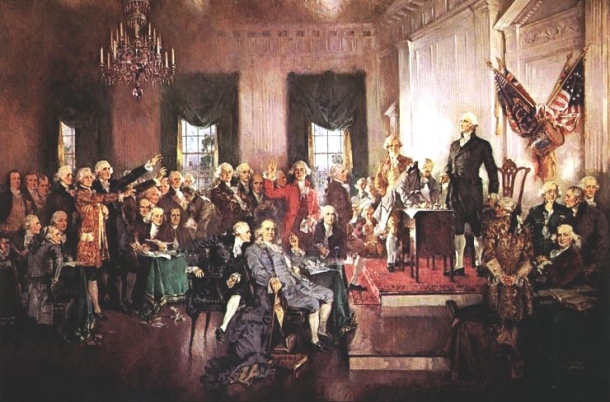 The story of the Julius and Ethel Rosenberg might well be the most dramatic in the history of US national security. It involves so much –atomic weapons, espionage, treason, blackmail, high stakes legal drama, ethnic loyalties, political beliefs, family betrayal, marriage, friendship, and ultimately, death. Students in History 282 will be viewing a gripping documentary about the case by the Rosenberg’s granddaughter, Ivy Meer0pol. “Heir to an Execution” (2004) provides a unique insider’s view of the story, showing the filmmaker as she tries to come to terms with the legacy of the case for her own, broken family. They will then use the film to inspire their own reflections on the challenges of balancing liberty with security in age of almost perpetual war.
The story of the Julius and Ethel Rosenberg might well be the most dramatic in the history of US national security. It involves so much –atomic weapons, espionage, treason, blackmail, high stakes legal drama, ethnic loyalties, political beliefs, family betrayal, marriage, friendship, and ultimately, death. Students in History 282 will be viewing a gripping documentary about the case by the Rosenberg’s granddaughter, Ivy Meer0pol. “Heir to an Execution” (2004) provides a unique insider’s view of the story, showing the filmmaker as she tries to come to terms with the legacy of the case for her own, broken family. They will then use the film to inspire their own reflections on the challenges of balancing liberty with security in age of almost perpetual war.
The Soviet Union detonated their first successful atomic bomb test in August 1949. Within a year, federal authorities in New York arrested Julius and Ethel Rosenberg. They stood trial in 1951, accused of conspiring to steal atomic weapons secrets from the US Army during World War II and sharing them with Soviet intelligence operatives. They were convicted of espionage and sentenced to death. The lengthy appeal of their case transfixed the world, but ultimately the Rosenbergs were executed on June 19, 1953.
Here are some helpful resources on this all-important episode:
The Trial of Ethel and Julius Rosenberg (wide array of resources from Douglas Linder, Famous Trials Project, University of Missouri-Kansas City School of Law)
FBI Records on the Atom Spy Case (read the now declassified case files straight from the G-men files)
New York Times coverage (1951-2014), including these highlights:
—3 IN ATOM SPY CASE ARE FOUND GUILTY; MAXIMUM IS DEATH (March 30, 1951)
—US Tells How It Cracked Code of A-Bomb Spy Ring (July 12, 1995)
–REVIEW: Capturing the Rosenbergs (June 13, 2004)
—Father Was a Spy, Sons Conclude With Regret (September 16, 2008)
—David Greenglass, the Brother Who Doomed Ethel Rosenberg, Dies at 92 (October 14, 2014)
There has also been some excellent coverage of this case over the years from the Los Angeles Times:
–Robert & Michael Meeropol, Essential Lessons of the Rosenberg Case (Oct. 5, 2008)
–(Profile of Miriam Moskowitz), 64 Years Later, a Battle to Erase a McCarthy-Era Conviction (November 25, 2014)


 The story of the Julius and Ethel Rosenberg might well be the most dramatic in the history of US national security. It involves so much –atomic weapons, espionage, treason, blackmail, high stakes legal drama, ethnic loyalties, political beliefs, family betrayal, marriage, friendship, and ultimately, death. Students in History 282 will be viewing a gripping documentary about the case by the Rosenberg’s granddaughter, Ivy Meer0pol. “Heir to an Execution” (2004) provides a unique insider’s view of the story, showing the filmmaker as she tries to come to terms with the legacy of the case for her own, broken family. They will then use the film to inspire their own reflections on the challenges of balancing liberty with security in age of almost perpetual war.
The story of the Julius and Ethel Rosenberg might well be the most dramatic in the history of US national security. It involves so much –atomic weapons, espionage, treason, blackmail, high stakes legal drama, ethnic loyalties, political beliefs, family betrayal, marriage, friendship, and ultimately, death. Students in History 282 will be viewing a gripping documentary about the case by the Rosenberg’s granddaughter, Ivy Meer0pol. “Heir to an Execution” (2004) provides a unique insider’s view of the story, showing the filmmaker as she tries to come to terms with the legacy of the case for her own, broken family. They will then use the film to inspire their own reflections on the challenges of balancing liberty with security in age of almost perpetual war.